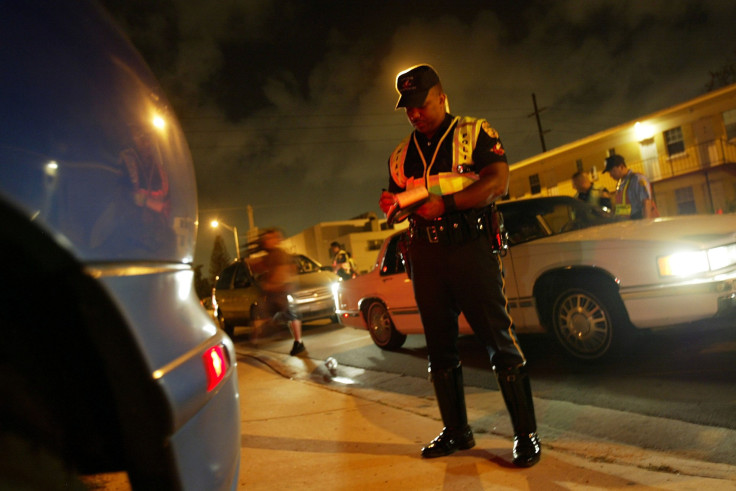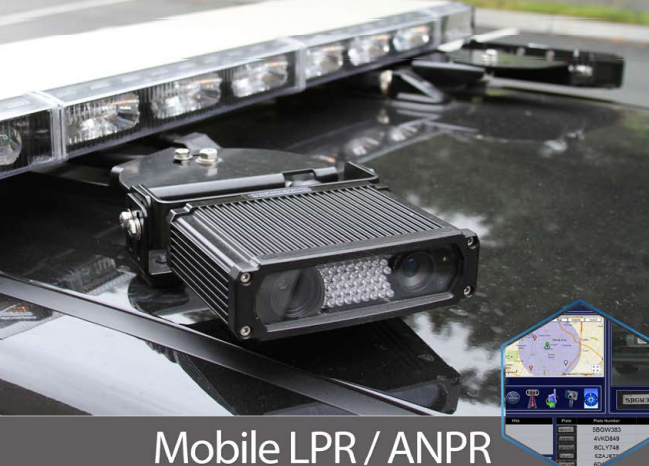Pay This Fee, Or Go To Jail: How License Plate Scanner Vigilant Solutions Makes Money In Texas

LOS ANGELES -- As the saying goes, "You can run, but you can’t hide." But in Texas there's an entirely new wrinkle if you're caught by the law: You may have to pay a private company to avoid jail time.
For the past several years, police departments around the country have been equipping their cruisers with license plate readers. The high-tech cameras, officially called "Automated License Plate Recognition (ALPR)" scanners, allow officers to quickly record large numbers of cars and immediately check to see if there's a warrant or unpaid parking violation on them. Police say they use the scanners to find fugitives and murderers, and to locate kidnapped children, but critics say the technology simply turns police into debt collectors.
Until recently, police departments bought the technology from private companies using county funds, or at least acquired them using government grant money. But one of the largest providers of the technology, Vigilant Solutions, based in Livermore, California, is experimenting with a new business model to attract police customers.
They’re giving the cameras, which cost up to $20,000 each, to police at “no cost.”
The catch: The contract allows the company to charge scofflaw motorists a 25 percent fee on top of an existing unpaid ticket. That fee — on average about $125, according to a company official — goes directly to the company. If the motorist can't afford the bill, however, police could potentially take the person to jail. The Electronic Frontier Foundation, which first reported the contract with Vigilant, called the deal a “devil’s bargain.”
Not surprisingly, many privacy advocates and lawyers are outraged by this new arrangement, which has been operational in three pilot programs in Texas, including Guadalupe County, the City of Orange, and the City of Kyle, according to the EFF. One defense attorney in Texas, Wayne Krause Yang, said he was “horrified” by the contracts.
“It really worries me that this corporation is sort of privatizing the police department to become bounty hunters — and pay Vigilant for the privilege,” says Yang, who serves as the legal director for the Texas Civil Rights Project. “It seems to me that this will put the burden unfairly on those who can least afford it. It would not surprise me that it would result in people being in jail who don't deserve to be there.”

In practice, the arrangement works something like this: Let’s say a motorist with unpaid traffic fines or court fees is driving along the highway. A police cruiser nearby gets an alert, and pulls the driver over. That motorist is then given two options by the police officer: Go to jail, or immediately pay the court fees he or she owes, plus the 25 percent, payable to Vigilant. (In 2015, Texas passed a law, H.B. 121, that allows police officers to install credit card readers in their patrol cars.)
A Vigilant Solutions representative, Josh Zecher, stressed in an email to International Business Times that this is not a debt collection program, and that people may actually save money by paying the fee in order to avoid jail. “If you want to look at the costs, the jail/impound model can cost a person significant amounts of money outside of the fine ($175 towing fee, $20 per day impound fee, day of lost work $96 (based on a $12-per-hour job),” Zecher wrote.
He added, “The new pilot program gives the officer, and the person with the warrant, options. Now, when they are located, they can still do the above (go to jail)… or they can clear the warrant at the roadside or online. Most agencies and individuals would prefer the latter.”
Zecher would not comment on how much money has been raised through these fees, or how many people decided to pay up versus choosing time in jail. He noted that the program was “still in its infancy” and only a “handful” of police are participating. “Over the next several months, we will be evaluating the program and determine additional expansion based on customer demand,” he wrote.
Though the private company does not disclose its revenue, Vigilant had raised $110 million of venture capital financing as of April 2015, according to financial filings.
The devices, which are about the size of a textbook, are mounted on the rear or top of a police car and connected to the officer’s in-car computer system. The devices use dual-lens (infrared and color) cameras to record vehicles as they pass, regardless of lighting conditions. Many of the cameras on the market can accurately read license plates at a distance of 50 feet away. Cops and the company say the technology is routinely used to catch suspects on the loose, or even solve old murder cases. Just this week, the company posted a success story in which the scanners were used to solve a 2002 murder case in Tennessee by finding a suspect on the run.
However, they are perhaps more typically used as a means of collecting unpaid parking violations and raising revenue for municipalities. In New York City, where the technology has been used for the past several years, license plate readers were responsible for almost 35,000 parking summonses in 2011, according to a 2014 Rand report. And in New Haven, Connecticut, police identified 119 vehicles with parking violations, resulting in $40,000 in city fines paid, in the first 12 hours of its use.
For police departments, the authors of the recent Rand report note that it's not hard to see the appeal. “With tight [police] budgets the likely norm for a time, spreading costs and developing strategies to raise revenues to maintain [license plate reader] systems are likely efforts for many departments,” they wrote.
In addition to raising county revenues, the devices also suck up enormous amounts of data within cities and towns where the scanners are used. Perhaps not suprisingly, recording all of this data has made the company — and the police departments that use them — a magnet for controversy among privacy advocates. In 2013, the EFF and American Civil Liberties Union sued the Los Angeles police department to get a week’s worth of scans to see what, exactly, the license plate readers were picking up.
The court initially refused to disclose that information on the grounds that the data collected were “records of law enforcement investigations” and thus closed to the public, but California’s Supreme Court will be reviewing that decision this year — a major coup for the EFF.
“As with all location data, this is particularly sensitive information, which can disclose things like what medical clinic you visit, where you worship, and what kind of political meetings you attend, as well as where your friends and family live,” writes EFF staff attorney Jennifer Lynch.
On its website, Vigilant notes that it has scanned 2 billion license plates. That number “grows at a rate of over 70 million per month.” The company’s founder, Shawn Smith, does not appear to speak publicly about the company, but a corporate biography suggests that he previously served as an officer in the U.S. Navy, “where he was a key developer of the U.S. Navy model for probabilistic risk assessment of nuclear reactor plants.”
Business is looking good for Smith and Vigilant. According to Transparency Market Research, the global automatic number plate recognition market was valued at $415 million in 2013 but could surge to over $1 billion by 2020.
Still, despite the fact that the systems are good at generating revenue, for both the company and the county, defense attorneys think they’ll ultimately target the pockets of lower-income individuals — while distracting from real police work.
“The incentives here are all wrong,” says Krause Yang. “Police are under-funded, but they should be taking on serious crimes. Suddenly we're turning them into money-incentivized meter maids."
© Copyright IBTimes 2024. All rights reserved.






















